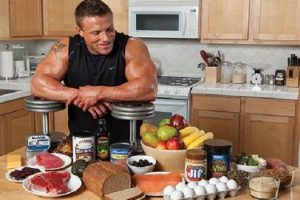Embarking on a journey towards fitness involves more than just the hours spent sweating it out in the gym. An often overlooked aspect of this journey is the post-workout period, a critical window where the right nutrition can play a pivotal role in recovery and muscle rebuilding. In this comprehensive exploration, we will delve deep into the intricacies of post-workout nutrition, understanding how to nourish your body effectively to optimize recovery and harness the full benefits of your exercise routine.
The Significance of Post-Workout Nutrition
Post-exercise, your body undergoes a series of physiological changes that create an opportune environment for nutrient absorption and muscle repair. The goals of an effective post-workout diet include:
- Muscle Recovery: Replenishing energy stores and providing essential nutrients to aid in the repair of muscle tissues damaged during exercise.
- Protein Synthesis: Maximizing protein synthesis, the process by which the body builds new proteins, crucial for muscle growth and repair.
- Hydration: Rehydrating the body to replace fluids lost through sweat and maintain optimal cellular function.
- Reducing Inflammation: Consuming anti-inflammatory foods to mitigate exercise-induced inflammation and promote overall well-being.
Timing is Crucial
The post-workout period is often referred to as the “anabolic window,” emphasizing the importance of consuming nutrients promptly after exercise. While the exact duration of this window may vary, it’s generally recommended to consume a post-workout meal or snack within 30 minutes to an hour after exercising.
- Carbohydrates and Protein: The combination of carbohydrates and protein during this timeframe is particularly effective in replenishing glycogen stores and initiating the muscle repair process.
- Whole Foods vs. Supplements: While convenience is a factor, whole foods should be prioritized over supplements to provide a broader spectrum of nutrients essential for recovery.
Carbohydrates: Replenishing Glycogen Stores
Carbohydrates play a vital role in post-workout nutrition, especially in replenishing glycogen stores, the body’s primary source of energy during exercise.
- Fast-Acting Carbs: Consuming fast-acting carbohydrates like fruits, white rice, or sports drinks immediately after exercise can rapidly replenish glycogen levels.
- Complex Carbs: Incorporating complex carbohydrates such as sweet potatoes, quinoa, or whole grains in the post-workout meal provides sustained energy for recovery.
Protein: Building Blocks for Muscle Repair
Protein is crucial for muscle repair and growth. Adequate protein intake post-workout helps stimulate protein synthesis and accelerates the recovery process.
- Complete Proteins: Opt for complete protein sources like eggs, dairy, or lean meats to ensure you provide all essential amino acids necessary for muscle repair.
- Plant-Based Proteins: For those following a plant-based diet, combining various plant protein sources such as beans, lentils, and quinoa can create a complete amino acid profile.
Fats: Supporting Overall Health
While the focus is often on carbohydrates and protein, including healthy fats in your post-workout diet is essential for overall health and well-being.
- Omega-3 Fatty Acids: Foods rich in omega-3 fatty acids, such as fatty fish or flaxseeds, have anti-inflammatory properties that can aid in reducing exercise-induced inflammation.
- Avocado and Nuts: Incorporating sources of healthy fats like avocados and nuts adds flavor and additional nutrients to your post-workout meal.
Hydration: Replenishing Fluids and Electrolytes
Hydration is a key component of post-workout recovery. Replacing fluids lost through sweat is crucial for maintaining optimal cellular function and supporting overall health.
- Water: Drinking water helps rehydrate the body and is a simple yet effective way to support recovery.
- Electrolytes: For intense or prolonged exercise, consider beverages with added electrolytes to restore the balance of sodium, potassium, and other electrolytes lost through sweat.
Anti-Inflammatory Foods: Reducing Exercise-Induced Inflammation
Exercise, while beneficial, can induce inflammation in the body. Including anti-inflammatory foods in your post-workout diet can help mitigate this response and promote a faster recovery.
- Turmeric and Ginger: Spices like turmeric and ginger have potent anti-inflammatory properties and can be incorporated into post-workout meals or consumed as teas.
- Berries: Berries, rich in antioxidants, can help combat oxidative stress and inflammation induced by exercise.
Sample Post-Workout Meals
Now that we’ve covered the essential components of a post-workout diet, let’s explore some sample meal ideas to guide you in nourishing your body effectively after exercise.
- Grilled Chicken Salad with Quinoa: A combination of lean protein from grilled chicken and complex carbohydrates from quinoa, paired with a variety of colorful vegetables, creates a nutrient-rich post-workout meal.
- Salmon and Sweet Potato: Baked salmon, rich in omega-3 fatty acids, combined with sweet potatoes, a complex carbohydrate source, provides a well-balanced post-exercise meal.
- Greek Yogurt Parfait: Greek yogurt offers a protein boost, while adding granola and mixed berries provides a mix of carbohydrates and antioxidants for recovery.
- Whole Grain Wrap with Turkey and Veggies: A whole grain wrap filled with turkey, assorted vegetables, and a spread of avocado creates a convenient and satisfying post-workout option.
- Vegetarian Stir-Fry with Tofu: Tofu, a plant-based protein source, combined with a colorful array of stir-fried vegetables and brown rice offers a nutrient-dense post-exercise meal.
Individual Considerations
As with pre-workout nutrition, the effectiveness of post-workout nutrition varies from person to person. Consider the following factors when tailoring your post-exercise diet:
- Exercise Intensity: The intensity and duration of your workout influence your nutritional needs. Intense or prolonged exercise may require a more substantial post-workout meal.
- Dietary Preferences: Choose foods that align with your dietary preferences and restrictions. Flexibility and enjoyment in your post-workout meals contribute to long-term adherence.
- Health Goals: Your specific health and fitness goals play a role in determining the composition of your post-workout diet. Whether it’s muscle gain, weight loss, or overall well-being, tailor your nutrition to support these objectives.
- Recovery Time: Consider the frequency of your workouts. If you engage in multiple sessions per day or have limited time between workouts, optimizing your post-exercise nutrition becomes even more crucial.
Supplements: Enhancing Post-Workout Recovery
While whole foods should be the foundation of your post-workout nutrition, supplements can be convenient additions to support recovery.
- Protein Powder: Whey or plant-based protein powders can be added to shakes or smoothies for a quick and easily digestible source of post-workout protein.
- BCAAs (Branched-Chain Amino Acids): BCAAs are amino acids that can be consumed in supplement form to support muscle protein synthesis and reduce muscle soreness.
- Fish Oil: If you struggle to incorporate fatty fish into your diet, fish oil supplements can provide omega-3 fatty acids to support anti-inflammatory processes.
Conclusion: Crafting Your Ideal Post-Workout Diet
In conclusion, the post-workout period is a critical phase in your fitness journey that demands careful attention to your nutritional intake. Crafting an effective post-workout diet tailored to your specific needs can significantly enhance your recovery, muscle building, and overall well-being. By understanding the significance of timing, the roles of carbohydrates, proteins, and fats, the importance of hydration, and the benefits of anti-inflammatory foods, you can optimize your post-exercise nutrition for maximum results.
The key takeaway is to prioritize nutrient-dense whole foods that provide a well-rounded blend of macronutrients and micronutrients essential for post-workout recovery. A balanced meal that combines lean proteins, complex carbohydrates, healthy fats, and plenty of fruits and vegetables can fuel your body’s recovery process and promote optimal muscle repair and growth.
Additionally, maintaining consistency and adhering to a well-structured post-workout nutrition plan can contribute to long-term progress and prevent setbacks in your fitness journey. Regularly monitoring your body’s response to different foods and adjusting your diet accordingly is crucial in fine-tuning your nutrition for sustained results.
Beyond nutrition, other lifestyle factors, such as adequate sleep, stress management, and overall dietary balance, play a synergistic role in optimizing post-workout recovery and achieving your fitness goals. Prioritizing these aspects in conjunction with a well-crafted post-workout diet can further amplify your progress and contribute to a holistic approach to health and wellness.
Finally, it’s essential to consult with a healthcare professional or a registered dietitian, especially if you have specific dietary considerations, health concerns, or unique fitness goals. A personalized approach to post-workout nutrition can provide you with tailored guidance that aligns with your individual needs and helps you achieve your desired outcomes safely and effectively.
In summary, post-workout nutrition is a fundamental component of any comprehensive fitness regimen. By strategically selecting nutrient-dense foods, staying hydrated, and considering the timing of your meals, you can optimize your body’s recovery process and set the stage for consistent progress and long-term success in your fitness journey. Remember that every individual is unique, so it’s crucial to listen to your body, experiment with different nutritional strategies, and create a post-workout diet that works best for you, supporting your overall health and wellness goals.





Add Comment